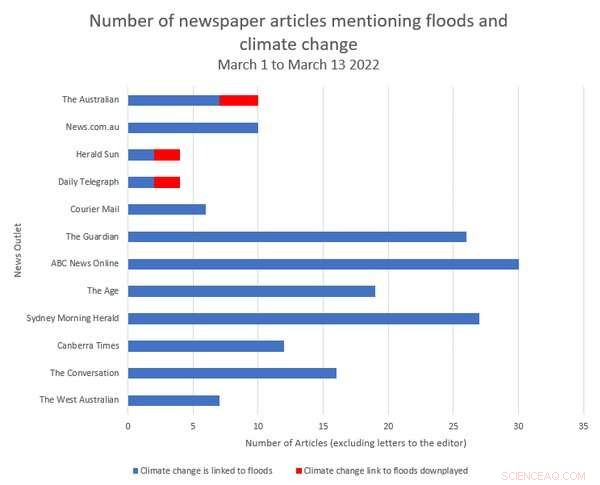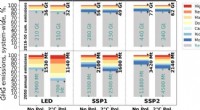
Wetenschap
Volgt News Corp de achteruitgang van de klimaatverandering? Analyse van de overstromingsdekking suggereert niet

Grafiek overstromingen klimaat
Enkele maanden geleden lanceerden de Australische media-nieuwskanalen Murdoch een nieuwe campagne voor klimaatverandering waarin werd gepleit voor een weg naar een netto-nuluitstoot tegen 2050. De lancering omvatte een 16 pagina's tellend omhullend supplement in al zijn roddelbladen die de noodzaak van klimaatactie ondersteunen.
We verwachten meestal niet dat nieuwsmedia campagnes voeren voor politieke en sociale doelen. Toch was hier een van de machtigste mediaorganisaties in het land, niet alleen implicerend dat het in het verleden een redactioneel standpunt heeft ingenomen tegen klimaatactie, maar ook een plan heeft aangekondigd om dit standpunt om te keren.
Bij de aankondiging van de lancering zei News Corp dat een belangrijke reden waarom klimaatactie in Australië tot stilstand is gekomen, is dat "het debat het slachtoffer is geworden van een cultuur van constante klachten."
"[...] dus hier zie je alleen positieve verhalen:echte, praktische en pragmatische oplossingen die de planeet zullen helpen en ook de belangen van Australië zullen helpen."
Kan een luipaard zijn vlekken veranderen? Mijn analyse van de recente berichtgeving over overstromingen van de Murdoch-winkels suggereert van niet.
Klimaatverandering gebagatelliseerd in overstromingsdekking
Klimaatverandering wordt op verschillende manieren gerapporteerd in de nieuwsmedia om het publiek te helpen de oorzaken en gevolgen ervan te begrijpen, evenals de beleidsreacties.
Door extreme weersomstandigheden zoals bosbranden en overstromingen kunnen journalisten op een urgente en visuele manier laten zien hoe klimaatverandering bijdraagt aan de ernst van natuurrampen.
Uit mijn analyse van de recente berichtgeving over overstromingen in de nieuwsuitzendingen van Murdoch blijkt echter dat hoewel de termen "klimaatverandering" en "overstromingen" in een reeks artikelen bij elkaar zijn geplaatst, deze nieuwsbladen nog steeds ver achterblijven bij andere als het gaat om het benadrukken van het verband tussen extreme weersomstandigheden en onze opwarmende planeet.
Ik keek naar 171 artikelen (zowel nieuws als opinie) in grote Australische gedrukte en online nieuwsmedia van 1 tot en met 13 maart die klimaatverandering en overstromingen samen noemden - en artikelen die het verband tussen de twee bagatelliseerden.
Er was een opvallende berichtgeving die de link maakte in ten minste één Murdoch-outlet, news.com.au. Dit omvatte een rapport over de waarschuwingen van de Klimaatraad voor de impact van klimaatverandering op overstromingen, en een ander over de impact van klimaatverandering op de voedselprijzen.
Toch bleef het totale aantal artikelen dat klimaatverandering in verband brengt met overstromingen in de winkels van Murdoch (waaronder ook The Australian, Herald Sun, Daily Telegraph en Courier Mail) achter bij ABC News, de Nine-kranten, The Guardian en The Conversation.
De analyse laat ook zien dat de Murdoch-outlets de enige nieuwsorganisaties waren waar stemmen beweerden dat de overstromingen niet waren. verergerd door klimaatverandering.
As reported by Crikey, The Guardian and ABC's Media Watch, conservative commentators such as Andrew Bolt and Chris Kenny continue to muddy the water when it comes to the impact of climate on extreme weather.
For example, Kenny wrote in The Australian on March 4:"The pretense that climate policies can relieve us of these natural traumas is a ridiculously emotive and deceptive ploy."
The Australian's Chris Mitchell even complained that other media outlets such as the ABC put too much emphasis on the link between climate change and flooding.
How the media advocate on issues
This analysis suggests the Murdoch outlets are not overtly advocating for climate action, nor linking catastrophic flooding with the need for political action aimed at achieving net zero by 2050.
Indeed, editorial hostility toward climate change is alive and well among the most powerful voices at the Murdoch outlets, with coverage that is seemingly more interested in advocating against climate action than for it.
This provides insight into different styles of news coverage and their influence on democratic debate.
Although Australian audiences expect media outlets to produce news that is objective, ideologically neutral and independent of politics, journalists and commentators sometimes play the role of "advocates" for particular issues and causes.
This style of journalism is not widely understood because it clashes with the idealized expectation that journalists shrug off their own perspectives to report without fear or favor.
In a recent study I conducted, I propose there are three styles of advocacy journalism—radical, collaborator and conservative. And each one either enhances or degrades democratic debate.
What I call "radical advocacy" is when journalists deliberately campaign to increase the diversity of voices in news media, particularly when those voices are marginalized from mainstream debate.
An example is The Guardian's "Keep it in the ground" campaign, which is transparently aimed at improving the public's understanding of climate change. This style of journalism—although subjective and biased—arguably has a positive influence on democracy since its mission is to increase understanding of a crucial global issue and rally the public to join the cause.
"Collaborator advocacy" journalism is when media organizations cooperate with government, such as when they broadcast flood warnings, advise the public what to do in an emergency or agree not to publish the locations of troops at war.
This style of advocacy can be good for democracy when it is deemed in the public interest. It can, however, be detrimental if the government controls media coverage to the point at which opposition voices are deliberately excluded.
The third style of advocacy—"conservative advocacy"—is one I've coined to describe journalism and commentary that promotes the agenda of powerful players in a political or social debate.
An obvious example is the Murdoch media traditionally siding with big fossil fuel and oil interests through their longstanding editorial hostility to policies designed to address climate change.
Conservative advocacy degrades democracy by locking less powerful voices out of the debate, spreading what some would deem misinformation and deliberately downplaying or countering scientific research and evidence-based policy.
If the Murdoch media follow through with their promise to advocate for net zero by 2050, their campaign would fit within the radical definition. But since these outlets are historically entrenched in a conservative tradition, this shift to a more radical position on climate might prove difficult to achieve.
 Een radicale benadering van methaanoxidatie tot methanol
Een radicale benadering van methaanoxidatie tot methanol Licht werpen op een schimmige organisatorische hub in cellen
Licht werpen op een schimmige organisatorische hub in cellen Ontdekking van een nieuw fenomeen, een game-changer voor efficiënte bioproductie van nuttige chemicaliën
Ontdekking van een nieuw fenomeen, een game-changer voor efficiënte bioproductie van nuttige chemicaliën Nieuw materiaal straalt wit licht uit bij blootstelling aan elektriciteit
Nieuw materiaal straalt wit licht uit bij blootstelling aan elektriciteit Chemicaliën die worden gebruikt in de chemie op de middelbare school
Chemicaliën die worden gebruikt in de chemie op de middelbare school
 We hebben de vulkaan Santorini met geluid onderzocht om te leren wat er onder het oppervlak gebeurt
We hebben de vulkaan Santorini met geluid onderzocht om te leren wat er onder het oppervlak gebeurt The Common Snakes of Oklahoma
The Common Snakes of Oklahoma  Klimaatverandering zal de Verenigde Staten armer maken,
Klimaatverandering zal de Verenigde Staten armer maken,  Dieren die afhankelijk zijn van Tides for Survival
Dieren die afhankelijk zijn van Tides for Survival  De samenstelling van de maricultuur:onderzoekers onderzoeken wereldwijde trends in de visteelt
De samenstelling van de maricultuur:onderzoekers onderzoeken wereldwijde trends in de visteelt
Hoofdlijnen
- Nieuwe irissoort ontdekt in de Langeberg Mountains, Zuid-Afrika
- Onderzoek toont een manier om een gemeenschappelijke basis te creëren over gen-editing
- Wat zijn de structurele delen van de lange botten in het lichaam?
- Geen zoetekauw meer? Wetenschap schakelt het verlangen naar suiker bij muizen uit
- Beyond AlphaFold:AI blinkt uit in het creëren van nieuwe eiwitten
- Okinawaanse pitadder-genoom onthult evolutie van slangengif
- Heb jij een innerlijke stem? Niet iedereen doet
- Het Bohr-model:snel vervangen maar nooit vergeten
- Beluga-walvissen veranderen wat ze eten als gevolg van klimaatverandering, studie vondsten
- Een wereldwijd belangrijk microbieel proces verborgen op mariene deeltjes

- Droogte in Mongolië - verleden, heden en toekomst

- 4 manieren om meer te weten te komen over wetenschap Deze zomer

- Materiaalefficiëntie biedt een groot potentieel voor klimaatneutraliteit

- Het tijdvenster voor het doel van 1,5 graad wordt gesloten

 SENSEI wordt stil:wetenschappers demonstreren deeltjesdetector voor donkere materie
SENSEI wordt stil:wetenschappers demonstreren deeltjesdetector voor donkere materie Schorpioengif om medicijnen in de hersenen te brengen
Schorpioengif om medicijnen in de hersenen te brengen Bewijs van uitbarstingen van overstromingen duidt op overvloedig water op vroege Mars
Bewijs van uitbarstingen van overstromingen duidt op overvloedig water op vroege Mars Inwoners van Illinois waarderen strategieën om de waterkwaliteit te verbeteren
Inwoners van Illinois waarderen strategieën om de waterkwaliteit te verbeteren Vijf soorten aseksuele reproductie
Vijf soorten aseksuele reproductie Onderzoek identificeert essentiële olieverbindingen die het meest giftig zijn voor bedwantsen
Onderzoek identificeert essentiële olieverbindingen die het meest giftig zijn voor bedwantsen shilling, goden en runen:Aanwijzingen in taal suggereren een Semitische supermacht in het oude Noord-Europa
shilling, goden en runen:Aanwijzingen in taal suggereren een Semitische supermacht in het oude Noord-Europa Heeft zonneschijn invloed op de besluitvorming van topmanagers?
Heeft zonneschijn invloed op de besluitvorming van topmanagers?
- Elektronica
- Biologie
- Zonsverduistering
- Wiskunde
- French | Italian | Spanish | Portuguese | Swedish | German | Dutch | Danish | Norway |

-
Wetenschap © https://nl.scienceaq.com

